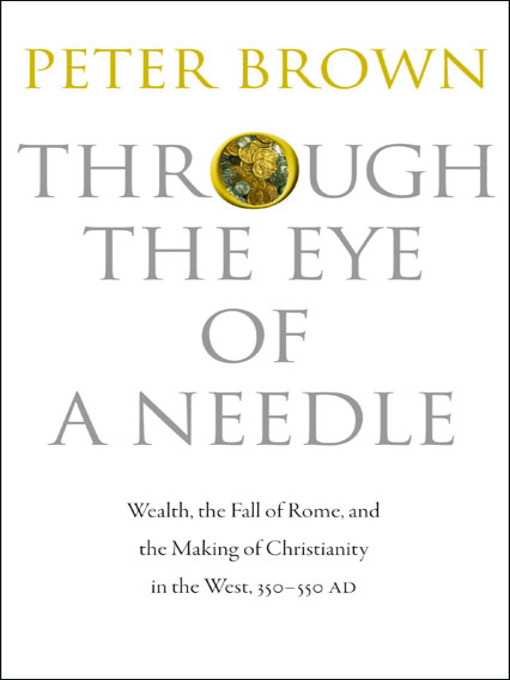
Through the Eye of a Needle
Wealth, the Fall of Rome, and the Making of Christianity in the West, 350-550 AD
کتاب های مرتبط
- اطلاعات
- نقد و بررسی
- دیدگاه کاربران
نقد و بررسی

Starred review from August 13, 2012
Drawing on Jesus’ exhortation to a rich young man that owning possessions and true discipleship are incompatible, many Christian traditions have stressed renunciation of worldly goods as the only authentic Christian response to wealth. Other Christians, using different passages from the Bible, teach that wealth can result from living a true Christian life, a result guaranteed by prayer for the blessings that God has for each of us. As Brown (Augustine of Hippo), the great dean of early church history, compellingly reminds us in his magisterial, lucid, and gracefully written study, the understanding of the role of wealth in the developing Christian communities of the late Roman Empire was much more complex. Combining brilliant close readings of the writings of Ambrose, Augustine, Jerome, and Paulinus of Nola with detailed examinations of the lives of average wealthy Christians and their responses to questions regarding wealth, he demonstrates that many bishops offered such Christians the compromises of almsgiving, church building, and testamentary bequests as alternatives to the renunciation of wealth. As wealthy Romans and believers of all classes joined Christian churches in the fifth century, the gifts that they had once bestowed on the empire in order to gain fame in this world could now be bestowed upon the church to enable the givers to join an eternal world. Brown’s immense, thorough, and powerful study offers rich rewards for readers.

September 1, 2012
Render unto Caesar, quoth the New Testament--even when Caesar is the church that Peter built. Brown (Poverty and Leadership in the Later Roman Empire, 2002, etc.) may be an emeritus professor of history at Princeton, but his research is resolutely up-to-date. So, too, is his language, as when he writes of a particular trope of the late Roman historian Ammianus, "this was no nostalgia trip on his part," and when he describes the imposition of the rule of celibacy on the priesthood as "consumer driven." That last makes particular sense in the context of this sizable book, in which Brown examines the long conflict between Christ-like immiseration and episcopal opulence, a conflict that has its roots in the economic history of the late Roman Empire. In that time, writes the author, there was an uneasy concord between the ruling nobility and the peasantry during a time when barbarian invasions and civil war were the new normal. When the empire dissolved, one way for a wealthy Christian to feel holy was to renounce wealth entirely in the way of the monks; another was to give all his money to the rising church, in which the monks took the place of all the poor outside the walls of the cloister. "Gifts to the city gained fame in this world and this world only," writes Brown. "By contrast, gifts within the churches were thought to join this world to a boundless world beyond the stars." Brown charts the growth of the church's "financial muscle," venturing intriguing asides as he proceeds on such matters as pagan vestiges within the beliefs of the church and lay society alike--the supernatural connection, for instance, of wealth to the turning of the seasons--and the fact that the ranks of the early Christian church were filled not by the meek and the poor, but instead by "moderately well-to-do townfolk." A hefty yet lucid contribution to the history of early Christianity.
COPYRIGHT(2012) Kirkus Reviews, ALL RIGHTS RESERVED.

September 15, 2012
Well known for his biography of Augustine of Hippo and his other books on religion in the era of late antiquity, Brown (history, emeritus, Princeton Univ.) traces in this newest work the establishment of the early Christian Church and its tense, complicated relationship with money in the western Roman Empire. Beginning just after the rule of the first Christian emperor, Constantine, and with extensive references to the lives and writings of major Christian writers, Brown traces the growth of the Church and the evolution of what it meant to be a Christian in this era--in particular, the religion's gradual impact on the social ideas of privilege and philanthropy, and how these ideas affected the people of the empire in ways both material and spiritual. VERDICT The sheer scope of this history is daunting, but scholars, theologians, and anyone interested in late Roman history or early Christianity will find this a fascinating view not only of the Church's development, but also of the changing concepts of wealth and poverty in the last centuries of the Roman empire.--Kathleen McCallister, Univ. of South Carolina Lib., Columbia
Copyright 2012 Library Journal, LLC Used with permission.

























دیدگاه کاربران